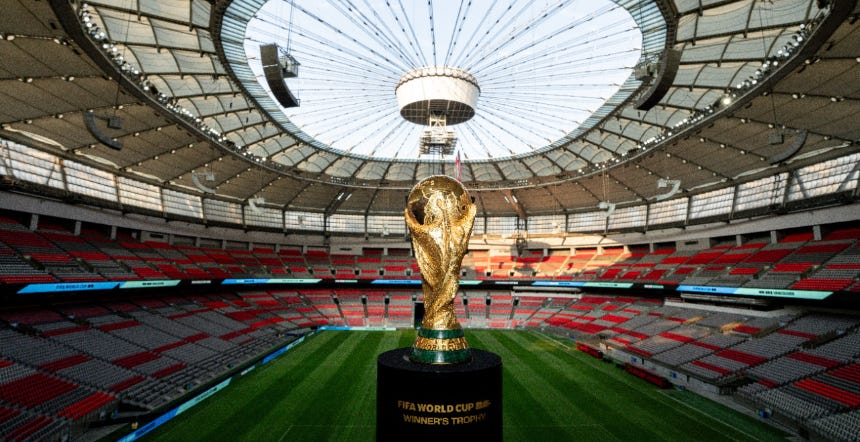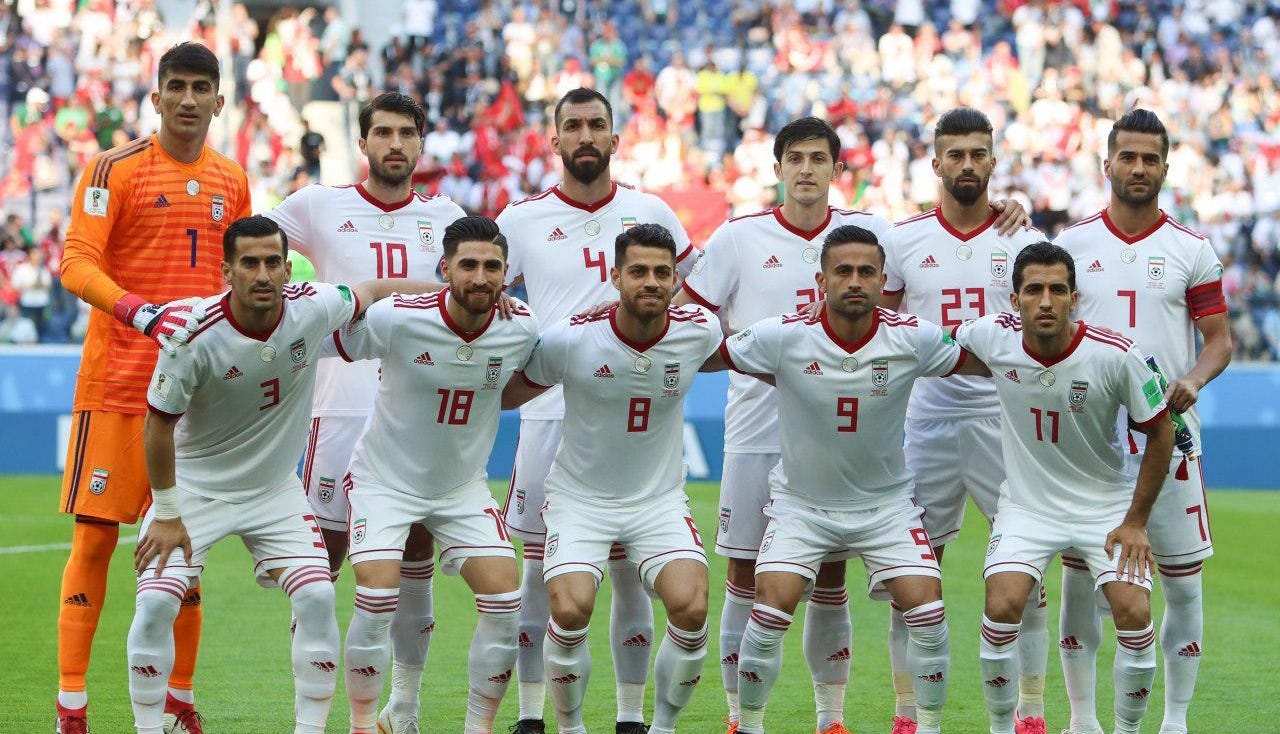Why Iran will be in Group A at the World Cup
With the 2026 World Cup in Canada, the US and Mexico around the corner, American immigration policy threatens its sporting integrity and could affect teams like Iran.
FIFA is likely already making contingency plans for next summer’s World Cup in North America, which is set to break attendance records and line the pockets of soccer’s governing body.
The tournament will be once-in-a-generation event, particularly for cities like Toronto who arguably haven’t had an era-defining moment like other Canadian cities who have hosted Expos and Olympic Games.
But is each team going to be able to field a complete roster?
FIFA and its president Gianni Infantino have long since sold their soul to the commercial Gods - but turning a blind eye to a World Cup missing several stars due to visa issues would be another step entirely.
Trump and his lackies have so far promised to support close personal friend “Johnny” and the rest of FIFA, who have tried their best to ingratiate themselves to the US President.
It’s a blatant attempt by both parties to try and use each other to hog the spotlight. As skilled as both are in the arts of sleaze, one side has taken clear advantage:
As became evident on the MetLife Stadium stage this summer, choosing to cozy up to a such a fickle administration comes with its pitfalls.
The ambit of CBP and ICE includes keeping so-called threats out of the country, which has had an effect on the sporting merit of past events.
In 2019, 11 players on Guatemala’s under-15 team were denied entry to the US for a youth age competition. Its not uncommon for immigration officers to reject visa applications, but the unusually high number raised eyebrows:
While some teams have had similar issues, that number is unprecedented, according to Guatemalan federation president Gerardo Paiz.
Although already eliminated from World Cup consideration, Cuba and its clubs are regular targets of this kind of selective enforcement of immigration laws.
Captain Yordan Santa Cruz was denied a visa to get into the 2019 Gold Cup stateside. This may have backfired for CBP, as Santa Cruz handed the armband to Yasmani López, who was let into the country but promptly defected.
Ahead of the 2021 tournament, the Cubans released a statement that they were unable to travel to Florida to participate in qualifying that year as the US had not provided the necessary entry visas.
Officially, los Leones were unable to travel due to COVID-related travel protocols, but CBP might have factored in the potential for defectors like López.
Foreign nationals are routinely turned away at ports of entry, and not just from the United States. Immigration officers have the discretion to deny entry for anything from past criminality to answering questions incorrectly during the interview.
World Cup Entry Visas
I’m guessing the P1A visa is the one in question here - it applies to temporary visitors performing at a specific athletic competition, like the World Cup, who fit the definition of:
An individual athlete at an internationally recognized level of performance;
Part of a group or team at an internationally recognized level of performance;
A professional athlete; or
An athlete or coach, as part of a team or franchise that is located in the United States and a member of a foreign league or association.
Traditionally, participants in these kinds of large sporting events are given some leeway and their applications are approved, or else fans might place an asterisk on the tournament’s outcome.
That was all before the second Trump administration.

These issues have resulted in a recurring rumour that more games will be shifted from the United States to Canada and Mexico. This seems unlikely, though, with groundwork already being laid for scheduling around the tournament next summer.
To put it simply, FIFA are in far too deep now to change course.
It already looks like previous assurances that everyone who needed the visas would get them might be rolled back.
CONCACAF head Victor Montagliani is less confident than Infantino was in 2017, telling the Vancouver Province in April that he “thinks” that all of the teams who qualify will play at the World Cup.
The travel issues - including outright rejection - experienced by fans trying to attend the Club World Cup in the United States this past summer were well-documented.
Support staff like coaches and physiotherapists may now find a barrier to entry next year as well. These essential personnel might face more scrutiny in having to demonstrate that they’re an integral part of the athletes’ performance.
Why Iran will be in Group A
The World Cup schedule may be locked in, but the participating teams are mostly unknown. Only the three hosts have their path laid out already.
FIFA has hinted that once the groups are randomly drawn, the rest of the teams will be placed in cities within that group that optimize the fan experience. In other words, teams will go where they’ll sell the most tickets.
That also leaves open the possibility of shifting teams into Canada and Mexico to miminize trips back and forth through US immigration.
Group A, in Mexico, is the only one taking place entirely outside of the United States. Other than the hosts or another top seed, each group will contain second, third and fourth seeded-teams, based on FIFA’s World Rankings.

Iran, whose nationals are regularly a target of US immigration, have already qualified from the Asian Football Confederation. They’ll likely be a second seed.
That means they can be drawn into Group A with Mexico. Which, given the noises FIFA has made over the last year, almost certainly suggests they will, despite the random draw usually employed at World Cups.
Locking a team into a specific group in this manner, outside of the host or, in past tournaments, the defending champion, would be highly unusual. But Team Melli present an unusual problem.
The mere prospect of Iran playing in Canada few years ago resulted in heated debate in Ottawa, raising questions as to the ability of the players and their entourage to get the necessary entry visas.
The game was eventually cancelled. This under a Liberal government which was relatively friendly on immigration, at least in comparison to the nativist rhetoric currently dominating the United States.
If Iran were to qualify from Group A, which is a strong possibility, they may have to play a scheduled match in the US, meaning this problem isn’t going away. Organizers can delay any decision, though, by locking them in the group with Mexico.
The Northern Triangle in the World Cup
Guatemala, who I’ve already mentioned, and El Salvador and Honduras are all still competing for a World Cup place, and it looks likely that at least one (and possibly all three) will qualify:
The question stands, though, if they’ll be able to bring their full complement of staff, or even a complete roster.
They likely won’t join Iran in Group A, as Mexico can’t be drawn with other teams from the region - in normal circumstances, that is, which admittedly seem like a distant memory now.
For what it’s worth, the Trump administration has said that its various travel bans won’t affect coaches and staff, but soccer executives like Montagliani - also a Vice President in the FIFA Council - have already downplayed some of the promises made during the bid process.
This all seems like a far cry from FIFA’s expansive slogan adopted in 2018, which claimed that the World Cup that year was “For the Game. For the World.”
In contrast, the marketing for 2026 emphasizes that “WE ARE 26”.
“We” looks like a much smaller group this time.

